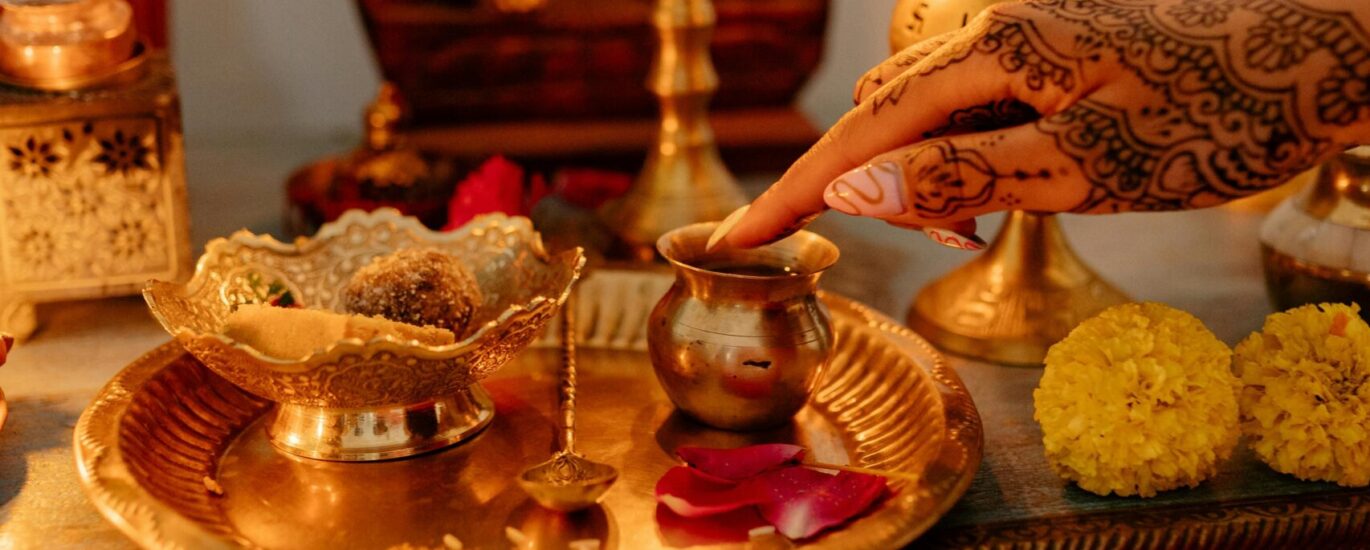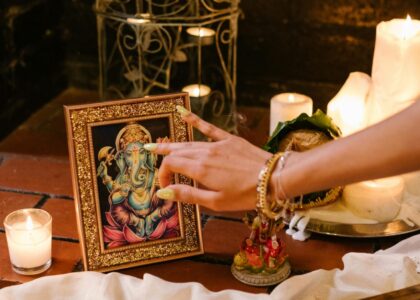In the hustle and bustle of modern life, finding moments of peace and happiness can seem like an elusive goal. However, ancient traditions offer timeless practices that can help us reconnect with our inner selves and achieve a state of tranquility. One such practice is pooja, a ritual of worship that has been central to Hindu culture for millennia. Rooted in the wisdom of Hindu scriptures, pooja offers a path to inner peace and happiness by fostering a connection with the divine, cultivating mindfulness, and aligning our lives with the cosmic order.
The Spiritual Significance of Pooja
Pooja, derived from the Sanskrit word “puja,” means reverence, honor, or worship. It is a ritualistic practice that involves offering prayers, flowers, food, and other symbolic items to a deity as an expression of devotion and gratitude. While the external acts of pooja are important, the true essence lies in the intention and devotion behind these actions.
The Bhagavad Gita (9.26) emphasizes the importance of devotion in pooja:
“Patram pushpam phalam toyam, yo me bhaktya prayacchati; Tad aham bhakty-upahritam, asnami prayatatmanah.”
(“If one offers Me with love and devotion a leaf, a flower, fruit, or water, I will accept it.”)
This verse highlights that it is not the grandeur of the offering that matters, but the sincerity and purity of heart with which it is made. Pooja becomes a medium through which devotees express their love, surrender, and connection to the divine.
Pooja as a Path to Inner Peace
One of the most profound benefits of pooja is the sense of inner peace it can bring. In the Rigveda (10.90), the Purusha Sukta hymn describes the universe as a cosmic being, with all creation being interconnected. By performing pooja, individuals align themselves with this cosmic order, bringing a sense of harmony and balance to their lives. This alignment helps to calm the mind, reduce stress, and cultivate a deep sense of peace.
Pooja also serves as a form of mindfulness, a practice that is increasingly recognized for its mental health benefits. During pooja, the devotee’s mind is fully engaged in the ritual, whether it be through the recitation of mantras, the offering of flowers, or the lighting of a lamp. This focused attention on the present moment helps to quiet the mind, making it easier to let go of worries and distractions.
The Upanishads (Mundaka Upanishad 2.2.10) speak of the tranquility that arises from spiritual practice:
“Nayam atma balahinena labhyo, na medhaya na bahuna srutena.“
(“The Self cannot be attained by the weak, nor by those devoid of energy, nor by those who engage in mere scriptural studies.”)
This emphasizes that inner peace is not just a passive state, but something that must be actively cultivated through spiritual discipline, such as pooja.
Pooja as a Source of Happiness
Happiness, according to Hindu philosophy, is not found in external possessions or achievements, but in the realization of one’s true nature as a divine being. Pooja helps to facilitate this realization by creating a space for self-reflection and connection with the divine.
The Bhagavad Gita (6.27) highlights the joy that arises from spiritual practice:
“Prashanta manasam hyenam, yoginam sukham uttamam; Upaiti shanta rajasam, brahma bhutam akalmasham.”
(“The yogi whose mind is calm, whose passions are subdued, and who is free from sin, experiences supreme happiness in the union with Brahman.”)
Through pooja, the devotee experiences a sense of fulfillment and contentment that transcends the temporary pleasures of the material world. The act of worship reminds us of our inherent connection to the divine and the eternal joy that comes from this realization.
Moreover, pooja fosters a sense of gratitude and humility, which are key ingredients for lasting happiness. By acknowledging the blessings we receive from the divine, we shift our focus from what we lack to what we have, cultivating a mindset of abundance and joy.
Conclusion: The Transformative Power of Pooja
In a world that often feels chaotic and overwhelming, pooja offers a sanctuary of peace and happiness. By aligning ourselves with the divine and the cosmic order, we can cultivate a deep sense of inner calm and contentment. The wisdom of Hindu scriptures underscores the transformative power of pooja, guiding us toward a life of spiritual fulfillment and lasting joy.
Whether practiced daily or on special occasions, pooja is more than a ritual—it’s a powerful tool for personal transformation. At Daily Vanakkam, we help you to attain the divine blessings of peace, happiness, and spiritual growth, ultimately leading to a more balanced and harmonious life.




